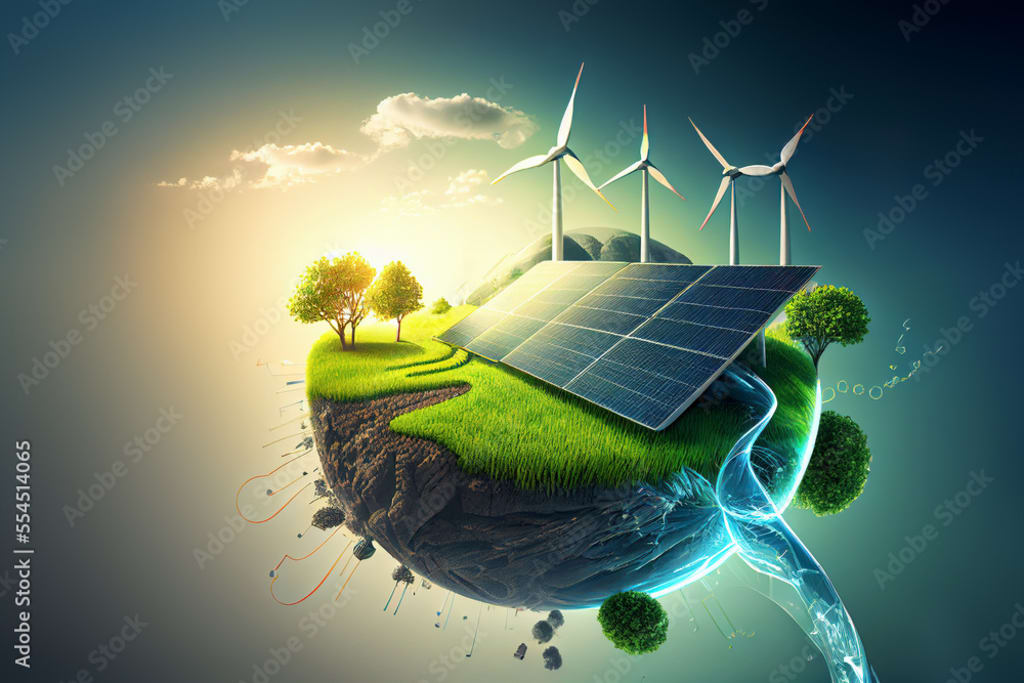The Role of Renewable Energy in Sustainable Development
Balancing Environmental Protection, Economic Growth, and Social Equity

Sustainable development, defined as development that meets the needs of the present without compromising the ability of future generations to meet their own needs, hinges on the balance between economic growth, environmental protection, and social equity. Renewable energy sources—such as solar, wind, hydro, and biomass—play a critical role in achieving this balance, offering numerous benefits that align with the principles of sustainable development.
Environmental Benefits
One of the most significant advantages of renewable energy is its potential to mitigate climate change. Traditional fossil fuels, such as coal, oil, and natural gas, release large amounts of carbon dioxide (CO2) and other greenhouse gases (GHGs) when burned for energy. These emissions are the primary drivers of global warming and climate change. In contrast, renewable energy sources produce little to no GHG emissions. For instance, solar and wind power generate electricity without burning fuel and emitting CO2. By shifting to renewable energy, we can significantly reduce our carbon footprint, slowing the rate of climate change and reducing its adverse impacts on ecosystems and human societies.
Moreover, renewable energy technologies generally have lower environmental impacts compared to conventional energy sources. They often require less water for operation and produce minimal air and water pollution. This reduction in pollution translates to better air and water quality, which is vital for the health of both ecosystems and human populations.
Economic Benefits
Renewable energy also drives economic growth and job creation. The renewable energy sector is labor-intensive, meaning it creates more jobs per unit of electricity generated compared to fossil fuel technologies. According to the International Renewable Energy Agency (IRENA), the renewable energy sector employed over 11 million people globally in 2018. These jobs range from manufacturing and installation to maintenance and research and development, providing opportunities across various skill levels and regions.
Furthermore, renewable energy can enhance energy security by diversifying the energy supply and reducing dependence on imported fuels. Many countries spend a significant portion of their GDP on importing fossil fuels, which can be subject to volatile prices and geopolitical tensions. By investing in domestically available renewable resources, countries can stabilize their energy prices and improve their energy independence. This stability is particularly crucial for developing nations, which often suffer the most from energy price fluctuations.
Social Benefits
Access to affordable, reliable, sustainable, and modern energy is one of the United Nations' Sustainable Development Goals (SDG 7). Renewable energy can play a pivotal role in achieving this goal, especially in remote and underserved areas. Decentralized renewable energy systems, such as solar home systems and mini-grids, can provide electricity to communities that are not connected to the main power grid. This access to electricity can improve the quality of life by powering schools, healthcare facilities, and businesses, thereby fostering social and economic development.
Renewable energy projects can also empower communities by involving them in the decision-making process and providing them with ownership stakes. Community-owned renewable energy projects, where local residents have a say and a share in the benefits, can enhance social cohesion and ensure that the economic benefits of renewable energy are more equitably distributed.
Challenges and Solutions
Despite the numerous benefits, the transition to renewable energy faces several challenges. One major challenge is the intermittent nature of some renewable energy sources, such as solar and wind. These sources do not produce electricity continuously, requiring advancements in energy storage technologies and grid management to ensure a stable energy supply.
Another challenge is the upfront cost of renewable energy infrastructure, which can be high compared to conventional energy projects. However, the long-term benefits, including lower operational costs and the avoidance of environmental damage, often outweigh these initial expenses. Policy measures, such as subsidies, tax incentives, and favorable regulations, can help offset these costs and encourage investment in renewable energy.
Conclusion
Renewable energy is integral to sustainable development, offering environmental, economic, and social benefits that align with the principles of sustainability. By reducing greenhouse gas emissions, creating jobs, enhancing energy security, and providing access to modern energy services, renewable energy contributes to a more sustainable and equitable world. To fully realize these benefits, concerted efforts are needed to overcome the challenges and accelerate the transition to a renewable energy future. This requires collaboration between governments, businesses, and communities to create an enabling environment for renewable energy development and deployment.
About the Creator
Pavitradevi
I'm Pavitradevi S, a passionate writer and lifelong learner dedicated to exploring the world through insightful and engaging articles. My writing journey spans across technology, health, personal development, and economy related .
Enjoyed the story? Support the Creator.
Subscribe for free to receive all their stories in your feed. You could also pledge your support or give them a one-off tip, letting them know you appreciate their work.






Comments
There are no comments for this story
Be the first to respond and start the conversation.